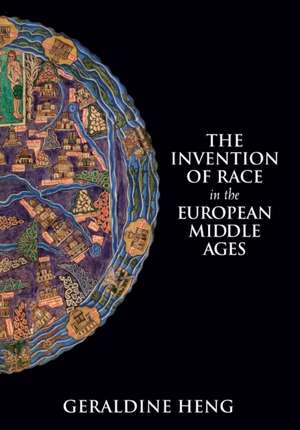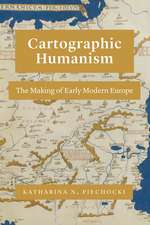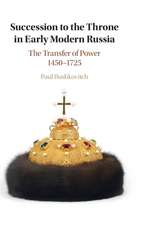The Invention of Race in the European Middle Ages
Autor Geraldine Hengen Limba Engleză Paperback – 27 noi 2019
| Toate formatele și edițiile | Preț | Express |
|---|---|---|
| Paperback (1) | 220.59 lei 3-5 săpt. | +47.62 lei 7-13 zile |
| Cambridge University Press – 27 noi 2019 | 220.59 lei 3-5 săpt. | +47.62 lei 7-13 zile |
| Hardback (1) | 426.74 lei 6-8 săpt. | |
| Cambridge University Press – 7 mar 2018 | 426.74 lei 6-8 săpt. |
Preț: 220.59 lei
Nou
Puncte Express: 331
Preț estimativ în valută:
42.21€ • 44.07$ • 34.93£
42.21€ • 44.07$ • 34.93£
Carte disponibilă
Livrare economică 15-29 martie
Livrare express 01-07 martie pentru 57.61 lei
Preluare comenzi: 021 569.72.76
Specificații
ISBN-13: 9781108435093
ISBN-10: 1108435092
Pagini: 434
Ilustrații: 10 b/w illus.
Dimensiuni: 179 x 253 x 24 mm
Greutate: 0.9 kg
Editura: Cambridge University Press
Colecția Cambridge University Press
Locul publicării:New York, United States
ISBN-10: 1108435092
Pagini: 434
Ilustrații: 10 b/w illus.
Dimensiuni: 179 x 253 x 24 mm
Greutate: 0.9 kg
Editura: Cambridge University Press
Colecția Cambridge University Press
Locul publicării:New York, United States
Cuprins
1. Inventions/Reinventions; 2. State/Nation; 3. War/Empire; 4. Color; 5. World I; 6. World II; 7. World III.
Recenzii
'For more than two decades scholars have been hotly debating the appropriateness of the term 'race' and its derivatives in the analysis of medieval European societies. Now, with this book, Geraldine Heng provides the most comprehensive and persuasive validation of race as a way into the medieval cultural 'imaginary'. Race, she acknowledges, was a concept that varied from place to place and changed in multiple ways over time. It was complexly intertwined with religious ideas, and although medieval notions of race shared content with some modern somatic notions (allowing for comparability), its specifically medieval distinctiveness owes much to the various faith communities within which it attained significance. This is not a book about blaming the Middle Ages or the West for racism; it is an erudite plea to pursue the study of racialisms, for truth's sake. No one interested in the vexing and tragic history of racial thought and the practices that it informed can afford to ignore this magisterial intervention into the scholarly conversation.' William Chester Jordan, Dayton-Stockton Professor of History, Princeton University, New Jersey
'[One cannot overstate the importance of The Invention of Race in the European Middle Ages.] Writing with astounding force and clarity, Heng accomplishes what has eluded literary scholars and historians: a breakthrough demonstration of how religion, as both sociocultural and biopolitical technology, produced 'race'. Heng shows that race is a name for an apparatus that structures and deploys human differences across the globe and time. Race would thus be the only adequate name for the process of difference-making. Heng renews the impetus for the global study of the Middle Ages and, in racial terms, shows what we have always known: that modernity is merely the effect of the Middle Ages.' Zrinka Stahuljak, University of California, Los Angeles
'… The Invention of Race in the European Middle Ages, provides a series of … studies that demonstrate the flexibility of this central thesis, with chapters functioning as densely textured sketches that articulate the mechanisms of racial logic at several geographically and culturally disparate local sites. … The Invention of Race is intended for a broad audience, whose expertise in the field of medieval studies is not assumed: for most of the book, this results in clear prose and translated source material.' Shoshana Adler, EuropeNow
'In The Invention of Race in the European Middle Ages (Cambridge), Geraldine Heng shows repeated cases which would unambiguously be classified as racially motivated hate crimes today, grounded in religion. This book is field-defining and vital in the current climate.' Kate Wiles, History Today
'… Heng does an impressive job weaving together various strands of scholarly conversation from a range of academic disciplines, in order to provide a multidimensional picture of how the concept of 'race' defined and redefined social realities in a period that has been habitually excluded from histories of racial categorization. While The Invention of Race may not seek to provide all the answers, it is a clarion call to continue to theorize and retheorize race in the premodern world.' Shyama Rajendran, Studies in the Age of Chaucer
'Straddling the complicated line between medieval studies and critical race theory, The Invention of Race in the European Middle Ages is a comprehensive volume that will change the ways in which medieval history is understood. … The debates raised and addressed in this work will challenge scholars to radically rethink how they approach the social histories with which they work, and for scholars who consider social context to be an essential aspect of their research, The Invention of Race is a must-read.' Jacqueline Lombard, Contemporaneity
'The book as a whole is finely produced, and its chapters are thoughtfully self-contained, each followed by its own endnotes-allowing for easy excerpting.' Julie Orlemanski, Modern Philology
'It is rich, learned, and thought-provoking, and it triggers important methodological and historiographic questions that bear on the essence of our discipline …' Joseph Ziegler, Speculum
'If anyone still doubts the conceptual validity of religious race, this is the book to convince them. At every turn, readers will be confronted with fascinating evidence - some of it familiar, some startlingly new, illumining surveys of scholarly debates, and rich interpretive work … [The Invention of Race in the European Middle Ages] will have a significant impact on scholarly paradigms in medieval studies and critical race studies alike for a long time to come.' Cord J. Whitaker, Critical Inquiry
'[One cannot overstate the importance of The Invention of Race in the European Middle Ages.] Writing with astounding force and clarity, Heng accomplishes what has eluded literary scholars and historians: a breakthrough demonstration of how religion, as both sociocultural and biopolitical technology, produced 'race'. Heng shows that race is a name for an apparatus that structures and deploys human differences across the globe and time. Race would thus be the only adequate name for the process of difference-making. Heng renews the impetus for the global study of the Middle Ages and, in racial terms, shows what we have always known: that modernity is merely the effect of the Middle Ages.' Zrinka Stahuljak, University of California, Los Angeles
'… The Invention of Race in the European Middle Ages, provides a series of … studies that demonstrate the flexibility of this central thesis, with chapters functioning as densely textured sketches that articulate the mechanisms of racial logic at several geographically and culturally disparate local sites. … The Invention of Race is intended for a broad audience, whose expertise in the field of medieval studies is not assumed: for most of the book, this results in clear prose and translated source material.' Shoshana Adler, EuropeNow
'In The Invention of Race in the European Middle Ages (Cambridge), Geraldine Heng shows repeated cases which would unambiguously be classified as racially motivated hate crimes today, grounded in religion. This book is field-defining and vital in the current climate.' Kate Wiles, History Today
'… Heng does an impressive job weaving together various strands of scholarly conversation from a range of academic disciplines, in order to provide a multidimensional picture of how the concept of 'race' defined and redefined social realities in a period that has been habitually excluded from histories of racial categorization. While The Invention of Race may not seek to provide all the answers, it is a clarion call to continue to theorize and retheorize race in the premodern world.' Shyama Rajendran, Studies in the Age of Chaucer
'Straddling the complicated line between medieval studies and critical race theory, The Invention of Race in the European Middle Ages is a comprehensive volume that will change the ways in which medieval history is understood. … The debates raised and addressed in this work will challenge scholars to radically rethink how they approach the social histories with which they work, and for scholars who consider social context to be an essential aspect of their research, The Invention of Race is a must-read.' Jacqueline Lombard, Contemporaneity
'The book as a whole is finely produced, and its chapters are thoughtfully self-contained, each followed by its own endnotes-allowing for easy excerpting.' Julie Orlemanski, Modern Philology
'It is rich, learned, and thought-provoking, and it triggers important methodological and historiographic questions that bear on the essence of our discipline …' Joseph Ziegler, Speculum
'If anyone still doubts the conceptual validity of religious race, this is the book to convince them. At every turn, readers will be confronted with fascinating evidence - some of it familiar, some startlingly new, illumining surveys of scholarly debates, and rich interpretive work … [The Invention of Race in the European Middle Ages] will have a significant impact on scholarly paradigms in medieval studies and critical race studies alike for a long time to come.' Cord J. Whitaker, Critical Inquiry
Notă biografică
Descriere
This book challenges the common belief that race and racisms are phenomena that began only in the modern era.












